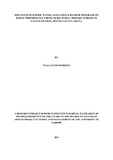| dc.contributor.author | Waga David O. | |
| dc.date.accessioned | 2013-10-25T11:40:55Z | |
| dc.date.available | 2013-10-25T11:40:55Z | |
| dc.date.issued | 2013 | |
| dc.identifier.citation | Master Of Arts In Project Planning And Management, University of Nairobi, 2013. | en |
| dc.identifier.uri | http://erepository.uonbi.ac.ke:8080/xmlui/handle/123456789/57894 | |
| dc.description.abstract | The study was carried out to evaluate the influence of school water, sanitation and hygiene programs on pupils’ performance among rural public primary schools in Maseno Division. Based on the Human Capital Theory, the study sought to generate information that would be useful in increasing investment in SWASH programs by linking the programs to pupils’ performance. The objectives of this study included; To find out how availability and access to safe drinking water influences pupils’ performance among rural primary school in Maseno Division; To assess how availability and access to sanitation facilities influences pupils’ performance among rural primary school pupils in Maseno Division; To explore how provision and access to hand washing facilities influences pupils’ performance among rural primary school pupils in Maseno Division; To examine how provision of hygiene education influences pupils’ performance among rural primary school pupils in Maseno Division. To achieve its objectives, the study adopted a descriptive survey design emanating from Quantitative research paradigm. A sample of 7 schools was selected from the total of 73 primary schools in the division using simple random sampling; a sample size of 360 pupils determined using Fisher’s formula was selected to participate in the study. A standardized questionnaire was used to collect data from the 360 pupils. Data collected was entered in SPSS version 20.0 and analyzed to establish any relationships between the SWASH programs and Pupils’ performance; this was achieved through the use of cross tabulation and correlation analysis. The study found out that treating drinking water at school could reduce absenteeism by 30%, using clean latrines at school could reduce absenteeism by 42%, hand washing after visiting the toilet and before eating could reduce absenteeism by 41% and that hygiene education has a strong positive relationship with academic performance with r2= 0.76.The discussions on the findings of the study led to the conclusion that availability and access to safe drinking water, availability and access to sanitation facilities, provision of hand washing facilities and hygiene education positively influenced the performance of pupils in rural public primary schools. The study recommended prioritization of SWASH programs during budgeting, mobilization of funds from alternative sources to implement SWASH programs and promotion of SWASH clubs in school to help pupils gain and sustain hygiene knowledge. | en |
| dc.language.iso | en | en |
| dc.publisher | University of Nairobi | en |
| dc.title | Influence Of School Water, Sanitation & Hygiene Programs On Pupils’ Performance Among Rural Public Primary Schools In Maseno Division, Kisumu County, Kenya. | en |
| dc.type | Thesis | en |
| local.publisher | Department of Extra-Mural Studies | en |

